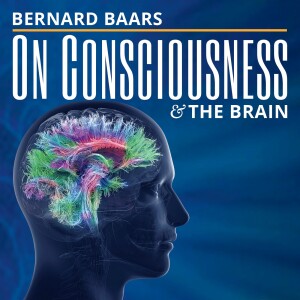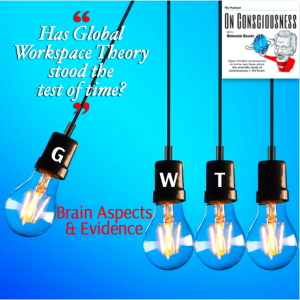
On Consciousness & the Brain with Bernard Baars
Science:Natural Sciences

#10 — Global Workspace Theory (GWT) - Brain Aspects and Evidence w/ Dr Jay Giedd | On Consciousness
 2020-06-02
2020-06-02
"All models are wrong, but some are useful." And I think ultimately that's the test of a construct like Global Workspace Theory - does it lead us to greater knowledge? Does it suggest areas of research? Does it make predictions that we can test? And that's why I think Global Workspace Theory has stood the test of time. It has succeeded on all of those fronts."
- Dr. Jay Giedd, Chair of child psychiatry at Rady Children's Hospital - San Diego and director of child and adolescent psychiatry, professor of psychiatry at UCSD School of Medicine, and professor in the Dept of Population, Family and Reproductive Health at Johns Hopkins Bloomberg School of Public Health.
EPISODE 10: Roundtable Part Three - Global Workspace Theory - Brain Aspects and Evidence with Dr. Jay Giedd
In the third part of their roundtable talk, neuroscientist David Edelman, Bernard Baars, originator of the global workspace theory and global workspace dynamics, and developmental neuropsychiatrist Jay Giedd consider underlying neural processes and anatomical features of Global Workspace Theory and continue on their journey to unravel the complexities surrounding conscious experiences.
How does consciousness come together in the brain? How does memory figure into conscious experience? Knowing how we acquire coherent perceptual insights about the world and then commit those insights to memory, can we tune the learning process to optimize the acquisition of new skills?
Get your 40% Discount for your copy of Bernie Baars' acclaimed new book On Consciousness: Science & Subjectivity - Updated Works on Global Workspace Theory
- GO TO: https://shop.thenautiluspress.com/collections/baars
- APPLY DISCOUNT CODE AT CHECKOUT: "PODCASTVIP"
Talking Points
- 00:00 – Intro by David Edelman.
- 02:09 – David Edelman prompts Baars to summarize the key points of the Global Workspace Theory.
- 07:41 – Has Global Workspace Theory been interpreted correctly by scientists? What did people get right and wrong about it?
- 09:11 – Baars argues against the idea that consciousness is a byproduct of human biology and that instead the two are interconnected.
- 11:09 – Jay Giedd on how Global Workspace Theory served as a great standing ground for research in the field of consciousness.
- 12:41 - The trio continue the conversation by discussing the virtually limitless potential of the human brain to learn novel information.
- 15:36 - Jay Giedd discusses how some human skills are diminishing with the advancement of technology.
- 18:02 - Edelman and Giedd engage in the process of defining consciousness and ponder upon the notion of what is necessary to create a conscious experience.
- 21:26 - Edelman asks Baars to explain from the standpoint of Global Workspace Theory, which mammalian brain areas are involved in the conscious process.
- 26:24 - Baars, Giedd, and Edelman discuss the limitations of brain imaging technology.
Summary of the Conversation
How does consciousness come together in the brain? How does memory figure into conscious experience? Knowing how we acquire coherent perceptual insights about the world and then commit those insights to memory, can we tune the learning process to optimize the acquisition of new skills?
In this engrossing episode of ‘On Consciousness,' Bernard Baars, David Edelman, and developmental neuropsychiatrist Jay Giedd consider Global Workspace Theory (GWT) and its underlying neural processes and anatomical features, as well as the development of the imaging technology which has afforded a detailed view of brain activity in near-real time that appears to support GWT.
To begin the discussion, Bernie provides an outline of GWT. He points to the paradox that our thought processes seem to unfold serially, yet the brain architecture underlying those thought processes resembles a collection of massively parallel processors. With this insight in mind, Bernie proposed a Global Workspace in which nonconscious processes arising in different neural regions come together, those processes are somehow polled, and the most ‘popular’ among them gets broadcast throughout the cerebral cortex, amounting to a sort of ‘ignition’ of conscious experience.
From Bernie’s summary of GWT, the discussion turns to perceptual learning. As humans negotiating an incredibly complex world, one of our greatest advantages is a long maturation period that affords us the time to acquire many sophisticated skills. Given time, a rich suite of sensory faculties, a large brain, and a good understanding of the neural processes underlying learning and memory, can we somehow optimize the acquisition of specialized skills? Elaborating on this, Jay proposes the prospect of replacing native skills that are losing ground to technology with new ones — sophisticated pattern recognition being just one example. Human beings are still much better at pattern recognition than the most powerful supercomputers.
Central to conscious perception is the ability of the brain to bind perceptual input from different sensory organs into cohesive, unified percepts that somehow hold together and persist in memory. Jay observes that during development, there must be an accretive weaving together of percepts which at some point passes a threshold of complexity, yielding conscious experience. But, when do developing humans and some non-human animals cross this rubicon of awareness? New imaging techniques, including fMRI and MEG, have made it possible for researchers to record some of the functional signatures of integration of percepts. Someday, using improved versions of such techniques, we may increasingly observe the emergence of complex states of consciousness in human infants and young non-human animals.
At the close of the discussion, Bernie, Jay, and David reflect on the work of Wilder Penfield, whose contributions included the identification of numerous brain regions with particular functional specializations and the seminal insight that the cerebral cortex is the organ of mind. The pioneering refinements in open skull surgery which made possible these contributions also led Penfield to observe that variations in blood coloration associated with changes in flow were strongly correlated with differences in brain area activation. In a sense, as Jay remarks, Penfield’s observation presaged the development of fMRI. Tempering the promise of neuroimaging, Jay and David conclude the conversation by pondering the shortcomings of fMRI, including limits on spatial and temporal resolution, extreme computational processing (which can lead to ‘data massaging’), and the danger of overinterpreting results.
Bios
David Edelman, PhD: A neuroscientist and currently Visiting Scholar in the Department of Psychological and Brain Sciences at Dartmouth College, David has taught neuroscience at the University of San Diego and UCSD. He was Professor of Neuroscience at Bennington College until 2014 and visiting professor in the Dept of Psychology, CUNY Brooklyn College from 2015-2017.
He has conducted research in a wide range of areas, including mechanisms of gene regulation, the relationship between mitochondrial transport and brain activity, and visual perception in the octopus. A longstanding interest in the neural basis of consciousness led him to consider the importance—and challenge—of disseminating a more global view of brain function to a broad audience.
*Watch Episode 10 on Our YouTube channel!
More Episodes
Create your
podcast in
minutes
- Full-featured podcast site
- Unlimited storage and bandwidth
- Comprehensive podcast stats
- Distribute to Apple Podcasts, Spotify, and more
- Make money with your podcast
It is Free
- Privacy Policy
- Cookie Policy
- Terms of Use
- Consent Preferences
- Copyright © 2015-2024 Podbean.com





